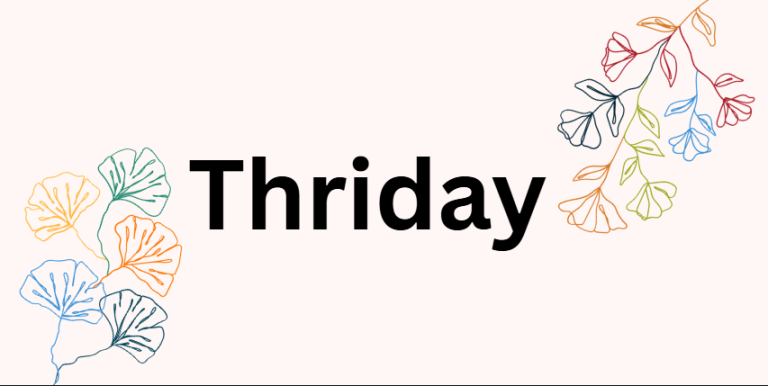“Thriday” is a fun, informal word. It is not in regular dictionaries, but people use it to describe a Thursday that feels like a Friday. In other words, when Thursday seems to be a day of relief or joy—almost like the weekend began early—some call it “Thriday.” (This usage appears in Urban Dictionary.)
Because Thriday is slang, its meaning can vary depending on context or who uses it. But the common idea is: a Thursday with the energy or mood of a Friday.
Why Do People Use “Thriday”?
Here are reasons why someone might call a Thursday a “Thriday”:
- Anticipation of Weekend
When people look forward to the weekend, Thursday evening might already feel relaxing and fun. They call it Thriday to capture that feeling. - Friday Is a Holiday or Off Day
If Friday is a holiday or someone’s day off, Thursday becomes the “final working day.” So Thursday feels like Friday. This situation often leads to Thriday usage. - Workweek Shortened
In some places or jobs, people might only work four days, and Thursday is their last workday. Then “Thriday” fits naturally. - Party Culture / Night Out
Some people go out Thursday night as if it’s Friday night. They treat Thursday evening as the start of social time. So they say “It’s Thriday tonight!”
How Is “Thriday” Different From “Thursday”?
- Thursday is a regular, standard word for the day after Wednesday and before Friday.
- Thriday is a playful or slang term. It gives extra meaning—Thursday is not just a regular weekday, but one with special brightness or excitement.
- Not everyone would understand Thriday if you use it in formal writing. It is more common in talk, social media, or informal texts.
Examples of Thriday in Use
- “I can’t believe it’s already Thriday—tomorrow is a holiday!”
- “Let’s start the party tonight—since Friday is off, Thursday is our Thriday!”
- “We finish early every Thursday, so it’s always Thriday for us.”
These sentences show how people use Thriday to express excitement, relaxation, or a break from routine.
Is Thriday an Official Day?
No, Thriday is not an official day in any calendar. It’s just slang, a creative way to think about Thursday. The real, recognized day is Thursday.
Using Thriday is about attitude—not changing the calendar. It’s a frame of mind: making Thursday feel better, more fun.
The Psychology Behind Thriday Feeling
Why might a Thursday feel like Friday? Here are some ideas:
- End-of-week fatigue relief: After several workdays, people feel tired—but also excited for rest.
- Attention to Friday plans: When people already have weekend plans, Thursday becomes a mental springboard.
- Reduced workload: Some jobs ease up on Thursday, giving people more freedom.
- Social habits: In some cultures, social events start earlier—Thursday night becomes part of weekend fun.
These factors combine to make Thursday feel lighter, more joyful, more like a weekend day.
Pros and Cons of Saying “Thriday”
Pros
- Adds fun, freshness to your week
- Gives a boost of positivity midweek
- Helps you feel like the weekend starts earlier
- Expresses excitement and relief
Cons
- Some people may not understand the term
- It’s informal—unsuitable for formal writing
- Overusing slang can reduce its impact
- It may set up expectation that Thursday must always feel “fun,” which isn’t always realistic
How to Introduce “Thriday” to Your Friends
If you want to use “Thriday” in your group, here are steps:
- Explain what you mean: “Thriday means Thursday that feels like Friday.”
- Use it on casual days: “Happy Thriday!” or “It’s Thriday already.”
- Add decorations or jokes: In chat groups, use emojis, GIFs, or memes about Thriday.
- Be aware: Some may not get it at first—just have fun with it.
Is “Thriday” Used in Business or Branding?
Yes, sometimes. The name “Thriday” is also used by a brand (in Australia) as a portmanteau (a combination) of “Thrive every day.”
In that usage, Thriday is not about Thursday specifically, but about daily growth, success, positivity. So the meaning shifts in that case from day-of-week to a more general philosophy.
FAQs
Q1: Is “Thriday” correct English?
A: In formal English, no. It’s slang or playful speech. It works in informal settings.
Q2: When did “Thriday” start?
A: The exact origin is unclear. It appears in slang dictionaries (e.g. Urban Dictionary) as a modern coinage.
Q3: Is Thriday common everywhere?
A: No, it depends on culture, language, and social media trends. In places where people like English slang and social media, it may be more known.
Q4: Can “Thriday” be used in writing, such as blogs?
A: Yes, in informal blogs or articles, using Thriday can show casual style. But avoid in essays, formal letters, business documents.
Q5: Does Thriday always refer to a Thursday before a holiday?
A: Often yes—but not always. Some use it just because Thursday feels good that week, even without a holiday.


